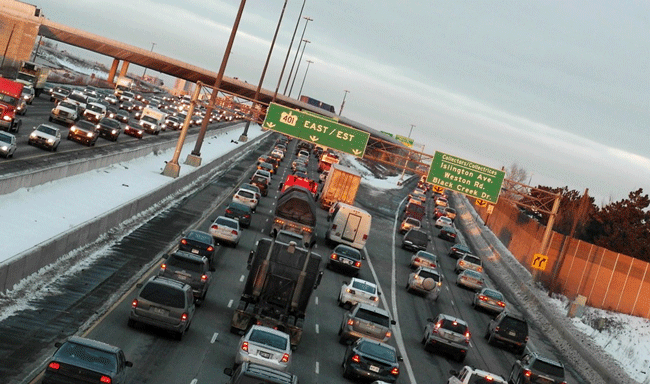
Clogged Toronto roads costing businesses, consumers hundreds of millions each year
by Canadian Manufacturing.com Staff

The congestion hits goods producing industries like manufacturing particularly hard, a new report finds. For exporters with complex supply chains and international customers, the logistical disruption can be particularly damaging

Overall, clogged roads disrupt one million tonnes—or $3 billion worth of goods—being trucked through the region each day. PHOTO: PLTam/Flickr
TORONTO—Worsening gridlock on the highways in and around Canada’s largest city is taking a bite out of the region’s economic productivity.
According to a new Toronto Region Board of Trade report, the sea of brake lights on the major traffic arteries along the Toronto-Waterloo corridor has become the area’s most pressing economic challenge, costing between $500 million and $650 million per year in added costs.
“Our products are not reaching their destinations on time, which negatively impacts our productivity,” said Jan De Silva, president and CEO of the Toronto Region Board of Trade. “We want the Corridor to be a highly attractive and sought after business region, but if we don’t manage our competitiveness challenges, our economy—like our goods and people—will remain stuck in traffic.”
The logistical malaise hits goods producing industries like manufacturing particularly hard, especially because of the Toronto area’s prodigious industrial output. Manufacturing accounts for about $64.3 billion of the region’s GDP and employs nearly 400,000 people, the report says.
Overall, clogged roads disrupt one million tonnes—or $3 billion worth of goods—being trucked through the region each day.
The costs of these delays are passed down to consumers through higher prices and translate to $125 per household per year, according to the Board of Trade.
Businesses, however, must also take the added logistical costs into account, which have a negative impact on their competitiveness against suppliers in other areas, particularly when exporting.
“Congestion also impacts our ability to move goods across the border and to global markets, De Silva added. “Trucks stuck on roads delay goods and parts shipments to markets across Canada, to the U.S. and overseas, impacting our integrated supply chains and limiting the ability to grow our economy through trade.”
While the Ontario government has committed millions of dollars to widening and extending highways throughout the Toronto area, clogged roads continue to take their toll. A Canadian Automobile Association report released earlier this year found the stretch of Highway 401 running through Toronto is the ninth busiest traffic artery in either Canada and the U.S.—and starting to compare to the famed gridlock in New York or Los Angeles.